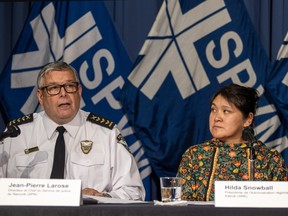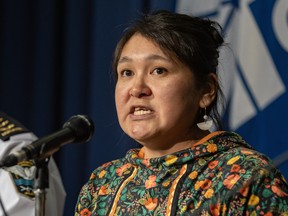Joint patrols targeting gang threats, intimidation and attacks in Montreal are made up of eight Nunavik and eight SPVM officers.

Article content
Gangs of illegal drug and alcohol traffickers who prey on villages in northern Quebec have been assaulting, threatening and intimidating members of the Inuit community in Montreal, the police forces of Nunavik and Montreal declared on Monday.
In response, the Montreal police department and the Nunavik Police Service (NPS) announced they’re deploying joint patrols in several sectors of Montreal over the next two weeks.
Advertisement 2
Story continues below
Article content
“It worries us a lot,” NPS director Jean-Pierre Larose said during a news conference at Montreal police headquarters. A slew of raids, seizures of drugs and contraband alcohol, and arrests in northern Quebec in recent months have destabilized the criminal gangs, which are retaliating against Inuit people who are in Montreal, he said.
Larose said he couldn’t provide details because of ongoing investigations. However, it’s known that criminal gangs based in southern Quebec “intimidate, threaten and attack” Inuit people in Montreal into remaining silent and not identifying the members of the gangs, he said.
Moreover, the traffickers are exploiting and recruiting young Inuit, many of them women, in Montreal to act as drug mules to transport the illegal drugs — mostly crack cocaine — and alcohol to the 14 villages making up Nunavik, which has a population of about 14,000. An estimated 1,000 to 1,500 Inuit are in Montreal, many of them temporarily while they undergo medical treatment or attend school.
“Unfortunately, in the Inuit community, victims or witnesses … do not tend to report these incidents or make complaints to the police,” Larose said.
Article content
Advertisement 3
Story continues below
Article content
The goal of the joint patrols is to reassure members of the Inuit community and encourage victims and witnesses to report incidents that compromise their safety or the safety of others, said Mohamed Aziz Bouhdid, a chief inspector with the Montreal police who heads the western section of its community services division. Anyone with information can also report incidents anonymously through Info-Crime Montréal and, in the north, through Crime Stoppers.
Hilda Snowball, chairperson of the Kativik Regional Government, said at the news conference that the joint patrols offer “another layer of protection.” Northern communities are resilient and have faced challenges in the past, she said, and they’re trying to deal with the impact of drugs and contraband alcohol entering their communities.
“With an increased presence of drugs, especially the hard drugs, coming into our communities, it’s impacting especially the youth,” she said. Some kids show up to school tired, and some don’t show up at all, she said.
With a rapidly growing population and a housing shortage, families are already living in overcrowded homes and now have to contend with the problem of having a person under their roof who has a drug problem, Snowball said. “So there has been an impact on the family as well as the community.”
Advertisement 4
Story continues below
Article content
The joint police patrols in Montreal began Monday and will be carried out on foot and by car four days a week until Oct. 4. The patrols are made up of eight Nunavik officers and eight Montreal officers, mainly from Stations 5, 12, 21 and 38.
“Two weeks is a beginning,” said Alain Vaillancourt, a Montreal city councillor and the city executive committee member responsible for public safety, who attended the news conference. The joint police patrols are the first of their kind in Quebec, he said. As well, he added, Montreal city hall and the Montreal police are preparing to go on a mission to northern Quebec in the coming weeks.
The joint patrols will focus on eastern downtown and the eastern part of Ville-Marie borough, Westmount and the western part of downtown, Plateau-Mont-Royal and the West Island suburb of Dorval.
Residents of northern Quebec who come to Montreal for specialized medical care are housed at the provincially funded Ullivik centre in Dorval. The suburb’s mayor, Marc Doret, told The Gazette in July that he was calling for a “frank discussion” about the sale of alcohol in the municipality following coroner’s reports on the deaths of two Inuit women staying at the centre who were struck by vehicles while wandering on nearby highways in 2022.

Officers from the Montreal and Nunavik police forces will also be meeting with organizations in Montreal that work with the Inuit community.
Recommended from Editorial
Advertisement 5
Story continues below
Article content
Article content


Comments